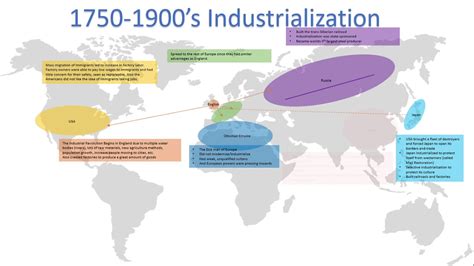The Industrial Revolution

The Industrial Revolution, a pivotal period in human history, commenced in Britain in the mid-18th century and subsequently spread across Europe and North America, ushering in an epoch of unprecedented technological advancements and societal upheaval. The Industrial Revolution bore transformative implications for global economies, politics, and social structures.
Causes of the Industrial Revolution
- Agricultural Revolution: Agricultural innovations, such as the seed drill and crop rotation, led to increased food production, freeing up labor for industrial pursuits.
- Population Growth: Rising population levels stimulated demand for goods and services, creating new markets for industries.
- Technological Innovations: Inventions such as the steam engine, spinning jenny, and power loom revolutionized production methods, enabling mass production and increased efficiency.
- Availability of Capital: The accumulation of wealth from colonial trade and agriculture provided the necessary capital for industrial investments.
Impacts of the Industrial Revolution
- Urbanization: Industrialization drew people from rural areas to cities where factories were concentrated, leading to rapid urbanization.
- Economic Growth: The Industrial Revolution fueled economic expansion and created new wealth and opportunities for entrepreneurs.
- Class Conflict: The rise of industrial capitalism created new social divisions between the wealthy factory owners and the working class, leading to labor unrest and social inequality.
- Environmental Degradation: Industrialization caused widespread environmental pollution, deforestation, and climate change.
Imperialism
During the 19th century, European powers embarked on a period of aggressive territorial expansion known as imperialism. Motivated by economic, political, and ideological factors, European nations colonized territories in Africa, Asia, and the Americas, carving out vast empires.
Causes of Imperialism
- Industrialization and Capitalism: The Industrial Revolution created new economic demands for raw materials and markets for manufactured goods, fueling the search for colonies.
- Nationalism and Competition: Nationalistic sentiments and the desire for global prestige spurred competition among European powers to acquire territories.
- Social Darwinism: The belief in the superiority of Western civilization justified the subjugation and exploitation of non-Western peoples.
- Technological Advancements: Steam-powered ships and firearms gave European powers a military advantage over indigenous populations.
Impacts of Imperialism
- Exploitation and Inequality: Colonialism led to the exploitation of resources and labor, enriching European powers while impoverishing colonized territories.
- Political and Cultural Change: Imperial powers imposed their political systems and cultural norms on colonized regions, often leading to the displacement of traditional customs and institutions.
- Resistance and Nationalism: Colonialism also inspired resistance movements and the rise of nationalist sentiments among colonized peoples.
The Rise of Nationalism
Nationalism, a powerful force in the 19th and 20th centuries, emerged in response to the forces of industrialization, imperialism, and political upheaval. Nationalism emphasized loyalty to one’s nation-state and the aspiration for national independence and self-determination.
Causes of Nationalism
- Industrialization: The Industrial Revolution created new economic and social ties, fostering a sense of shared identity and national consciousness.
- Romantic Nationalism: Romantic ideas glorifying national heritage, history, and language inspired patriotic sentiments.
- Imperialism: Colonialism provoked resistance and a desire for self-governance among colonized peoples.
- Political Revolutions: Revolutions, such as the French Revolution, spread ideas of popular sovereignty and national self-determination.
Impacts of Nationalism
- Independence Movements: Nationalism fueled independence movements in colonized territories, leading to the emergence of new nation-states.
- Political Unification: Nationalism fostered a sense of unity and cohesion within nation-states, promoting political stability and economic development.
- Conflict and Rivalry: Nationalism could also lead to conflicts between nations, as each sought to assert its power and influence.
Social and Cultural Change
The Industrial Revolution and imperialism brought about profound social and cultural transformations. Urbanization, industrial labor, and the spread of new ideas challenged traditional social structures and cultural norms.
Social Changes
- Class Structure: The Industrial Revolution created a new working class and a wealthy capitalist class, leading to increased class tensions and social stratification.
- Family Structure: Industrialization disrupted traditional family structures as women entered the workforce and extended families dissolved.
- Urban Life: Urbanization led to overcrowding, poverty, and new forms of social interaction and entertainment.
Cultural Changes
- Education and Literacy: Industrialization increased the demand for a skilled workforce, leading to the expansion of education and literacy.
- Popular Culture: Urbanization and the rise of mass media created a new popular culture characterized by mass-produced entertainment and consumerism.
- Scientific and Intellectual Revolutions: The Industrial Revolution ushered in an era of scientific and intellectual breakthroughs, including Darwin’s theory of evolution and the development of new technologies.
Conclusion
AP World Unit 5 examines the transformative era of global history from 1750 to 1914, a period characterized by the Industrial Revolution, imperialism, the rise of nationalism, and profound social and cultural change. Understanding these developments is crucial for comprehending the modern world’s economic, political, and social foundations.
